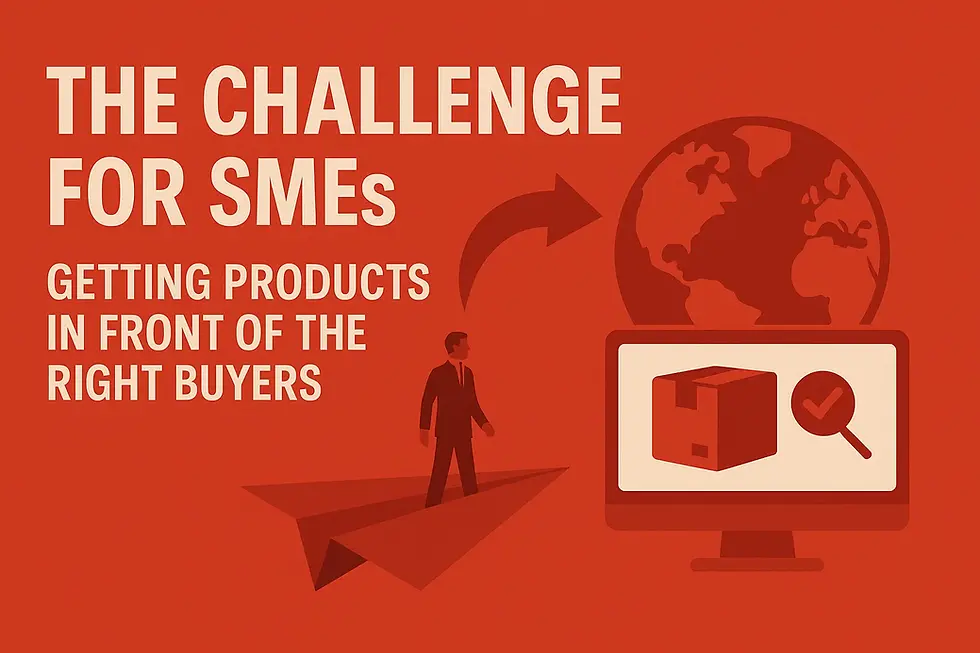Finding the Right India B2B Marketplace for Your Business
- Aarav Reddy
- Aug 25
- 4 min read
Many SMEs in India face the same struggle: limited visibility, unpredictable buyer leads, and rising costs of traditional sales. Even with a strong product line, reaching serious buyers often feels like a gamble. The solution more businesses are turning to is the business-to-business marketplace—a digital platform designed to connect suppliers and buyers at scale.

By joining such a marketplace, businesses move from chasing leads to being discoverable by buyers who are actively searching. This shift can mean faster deals, broader reach, and a more predictable sales pipeline.
This guide will walk you through why choosing an India B2B marketplace can transform your trade strategy, what features to evaluate, and how to make the most of your presence once you join.
What is an India B2B Marketplace?
An India B2B marketplace is an online hub where Indian suppliers, exporters, and manufacturers showcase their products to domestic and international buyers. Unlike consumer platforms, it focuses on wholesale transactions, recurring contracts, and bulk purchasing.
Key characteristics include:
Listings tailored for industrial and wholesale buyers
Inquiry and quotation tools for negotiations
Options for large-scale shipping and fulfillment
Secure payment processes suited for higher order values
Verified supplier profiles to build trust
For many SMEs, it functions as a permanent trade fair—available to buyers 24/7 without the high costs of travel or exhibitions.
Why Businesses Need a Marketplace in India
Overcoming Visibility Challenges
Relying on local agents or word-of-mouth limits your exposure. A marketplace places your catalog in front of buyers actively seeking suppliers in India, including international ones.
Reducing Sales Costs
Sales travel, exhibitions, and distributor margins cut into profits. Online marketplaces reduce acquisition costs by centralizing buyer-supplier interactions.
Winning Buyer Trust
Buyers often prefer dealing with suppliers listed in structured platforms because it reduces risk. Verified details, compliance information, and transparent communication help build confidence.
Expanding International Reach
India is seen as a key sourcing hub for textiles, engineering goods, chemicals, and more. A marketplace lets global buyers find Indian suppliers with ease.
Features to Look For in an India B2B Marketplace
Not all marketplaces are created equal. To make the most of your investment, focus on these features:
Strong Buyer Base
The larger and more diverse the buyer base, the more opportunities for inquiries.
Industry Coverage
Some marketplaces are general while others focus on specific sectors. Choose one aligned with your product category.
Tools for Negotiation
Quotation systems, bulk inquiry options, and chat tools streamline the decision process.
Trust and Verification
A good marketplace should offer supplier verification, certifications, and clear product categorization.
Scalability
Look for systems that allow you to expand your catalog, handle multiple inquiries, and manage bulk orders without friction.
The Transactional Value for SMEs
Joining an India B2B marketplace should be seen as an investment, not just an expense. The returns often show in:
Faster deal cycles: Buyers ready to purchase reduce long lead times.
Higher inquiry volume: More exposure equals more opportunities.
Reduced dependency: Less reliance on distributors and agents.
Better margins: Direct buyer interaction allows for healthier pricing.
Common Challenges and How to Handle Them
Intense Competition
With many suppliers listed, standing out is tough. Solution: build professional listings, highlight unique selling points, and respond faster than competitors.
Inquiry Quality
Not every lead will be genuine. Solution: set filters and qualify buyers before committing resources.
Digital Readiness
Businesses with poor product images or incomplete catalogs risk losing credibility. Solution: invest in clear product photography and accurate descriptions.
Capacity to Deliver
Attracting buyers means being able to fulfill orders reliably. Solution: only list products you can consistently supply.
Strategies for Success in an India B2B Marketplace
Complete Your Profile
Fill every detail—company history, certifications, production capacity, and contact methods.
Optimize Listings for Search
Use industry keywords naturally in product titles and descriptions. Buyers search using technical terms, so accuracy matters.
Offer Transparent Pricing Signals
Include minimum order quantities and indicative pricing ranges. This saves time by attracting only relevant buyers.
Build Buyer Relationships
Do not treat inquiries as one-time transactions. Follow up, understand buyer needs, and aim for repeat business.
Stay Active
Marketplaces reward suppliers who respond quickly and update listings regularly. Activity increases visibility.
The Future of India B2B Marketplaces
Marketplaces are becoming central to India’s trade landscape. Key trends include:
AI tools that match suppliers with buyers based on detailed criteria
More integrated payment and credit facilities
Logistics visibility built into the platform
Greater emphasis on sustainability and compliance in supplier listings
Businesses that adapt to these changes will not just survive—they will thrive.

Conclusion
An India B2B marketplace is more than a listing site. It is a transactional engine that connects suppliers to ready buyers, speeds up deal cycles, and lowers costs. For SMEs, it levels the playing field, opening doors to both domestic and international opportunities.
Choosing the right marketplace means evaluating features, preparing professional listings, and committing to active engagement. When done well, the return is clear: stronger visibility, more inquiries, and better margins.
Discover how an Online marketplace in India can help you build buyer trust and grow your trade faster.
FAQs
1. What kind of products are best suited for an India B2B marketplace?
Industrial goods, textiles, machinery, chemicals, and agricultural products are well-suited because they are purchased in bulk.
2. Do SMEs need a large budget to join?
No, most marketplaces have tiered options. The main investment is in preparing quality catalogs and managing inquiries.
3. How do I compete with larger suppliers?
By highlighting unique strengths such as flexible production, faster turnaround, or specialized expertise.
4. Is it worth joining if I only target domestic buyers?
Yes. Even for domestic trade, a marketplace offers wider reach, reduced acquisition costs, and a more reliable flow of inquiries.



Comments